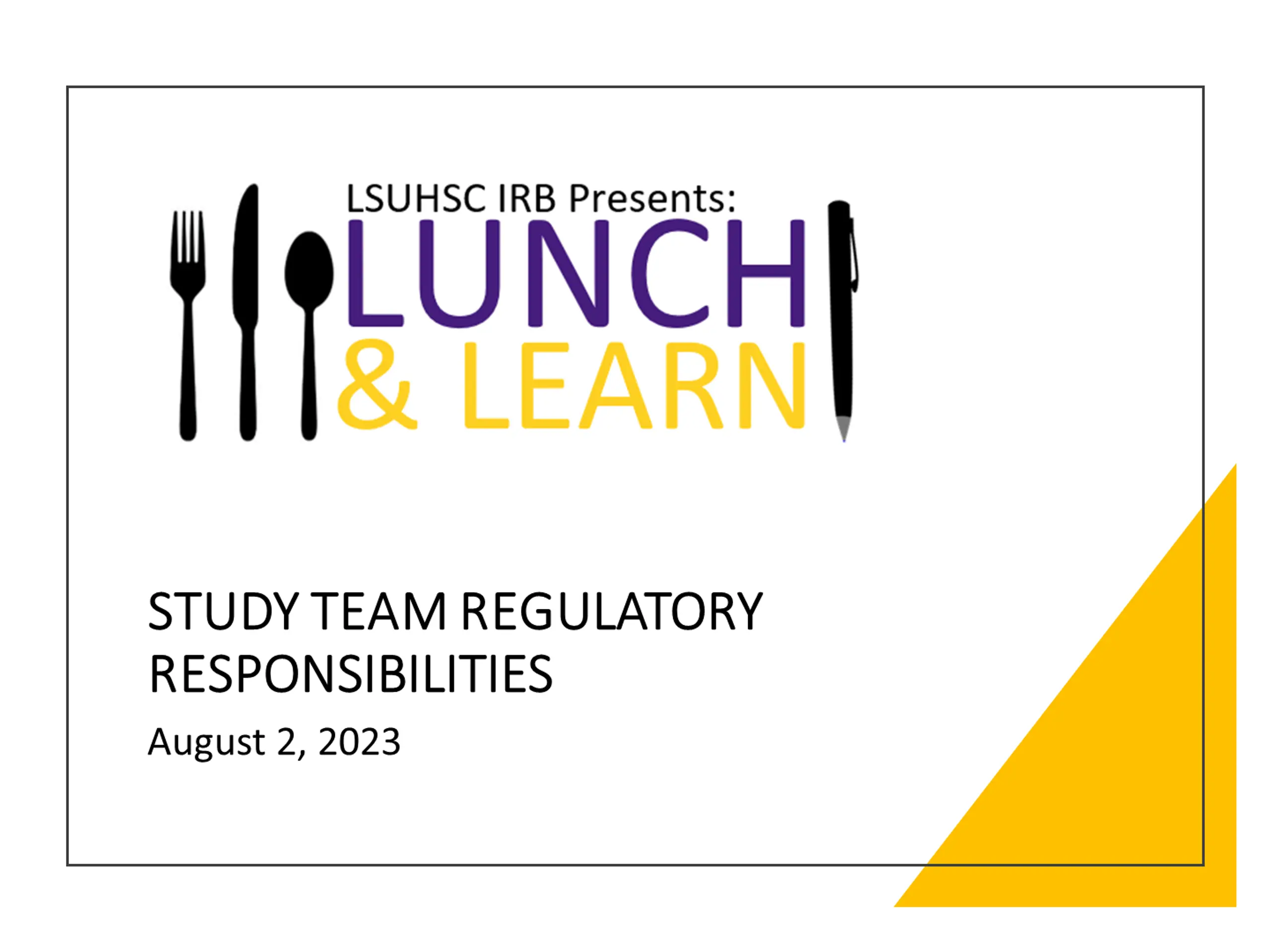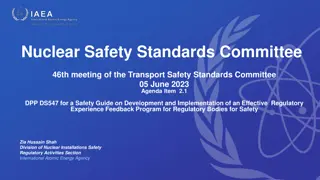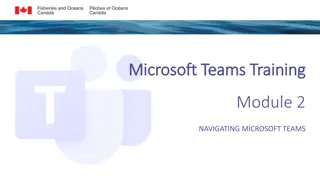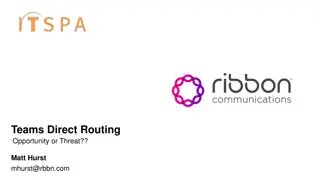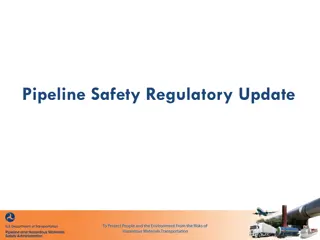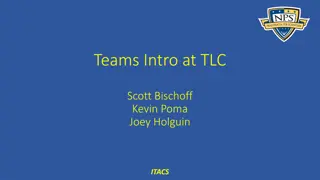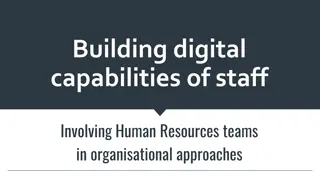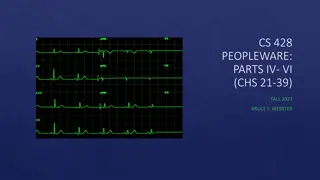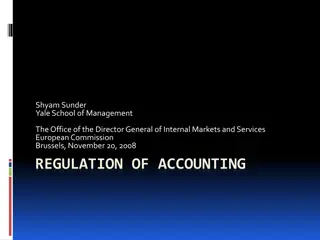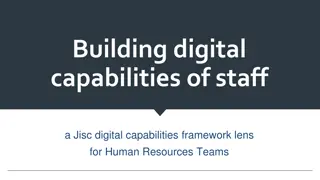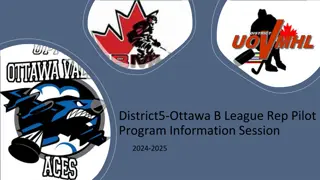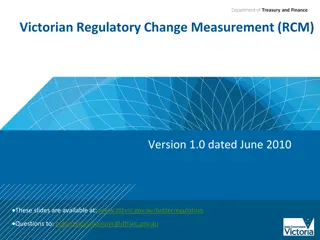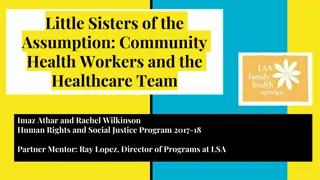Navigating Regulatory Responsibilities Within Study Teams
Understand essential roles & duties of study team members in regulatory compliance for successful clinical research. Explore best practices and key responsibilities in ensuring adherence to regulations. Gain insights on effective collaboration within study teams.
Download Presentation

Please find below an Image/Link to download the presentation.
The content on the website is provided AS IS for your information and personal use only. It may not be sold, licensed, or shared on other websites without obtaining consent from the author.If you encounter any issues during the download, it is possible that the publisher has removed the file from their server.
You are allowed to download the files provided on this website for personal or commercial use, subject to the condition that they are used lawfully. All files are the property of their respective owners.
The content on the website is provided AS IS for your information and personal use only. It may not be sold, licensed, or shared on other websites without obtaining consent from the author.
E N D
Presentation Transcript
STUDY TEAM REGULATORY STUDY TEAM REGULATORY RESPONSIBILITIES RESPONSIBILITIES August 2, 2023
Objectives To inform Study Teams of the regulatory responsibilities they have when conducting research 2
Regulatory Binders What is a purpose? Provides a framework for organizing essential study documents Ensures compliance with Good Clinical Practices Who is responsible for maintaining the regulatory binder? A delegated member of the study team, usually a coordinator How can a regulatory binder be stored? On paper in physical binders or electronic (i.e., secure drive, eReg system) What types of studies should maintain a regulatory binder? ALL STUDIES SHOULD HAVE A REGULATORY BINDER, NOT JUST CLINICAL TRIALS 3
Personnel Training Each study team member is responsible for keeping their own training up to date. Training Frequency Training Provider Required for Biomedical Research Every 3 Years CITI Personnel conducting biomedical or clinical research Social & Behavioral Research Every 3 Years CITI Personnel conducting social or behavioral research Good Clinical Practice Every 3 Years CITI Personnel conducting clinical trials Conflicts of Interest in Research Every 4 Years CATS All personnel HIPAA Privacy in Research Annual CATS All personnel Bloodborne Pathogens High Risk Annual CATS All personnel Shipping Biological Materials Every 2 Years CATS Personnel shipping biospecimens Annual COI Disclosure Annual Kuali All personnel 4
Submission of Renewals Federal regulations require an IRB to conduct continuing review of research at intervals appropriate to the degree of risk. Continuing reviews are submitted using the Renewal form in the Kuali Research (KR) electronic submission platform. When to Submit To ensure adequate time for the IRB to review a Renewal application, the Study Team is required to submit the Renewal form: No later than 30 days before the Continuing Review Date for studies approved by the Full Board No later than 15 days before the Continuing Review Date for studies approved by the Expedited or Exempt procedure 5
Halting Research Activities If IRB approval lapses, all research activities must stop immediately, except when the investigator judges it to be in the best interest of current participants to continue, in which case s/he must notify the IRB Office promptly. How to Resume the Study The Study Team may resume research activity once a Renewal application has been reviewed AND approved by the IRB. 6
Submission of Amendments Federal regulations require an IRB to conduct review of all proposed modifications to a research study prior to those modifications being implemented. Modifications to research are submitted using the Amendment form in the Kuali Research (KR) electronic submission platform. When to Submit The study team should submit any proposed changes to the research prior to implementing those changes. They should be submitted as soon as possible to avoid any delays in planned implementation. 7
Reportable New Information Any new information that may impact on the conduct of an IRB-approved research study or the safety and welfare of the participants in that study must be documented by the Study Team in the appropriate manner. PROMPT REPORTING NON-PROMPT REPORTING Time Frame: Next Renewal or Closure Method: Event Tracking Log RNIs that Do Not Require Prompt Reporting Unexpected & related/possibly related AEs Minor Non-Compliance Minor Consent/HIPAA Issues Minor Protocol Deviations AEs and UPs that DO NOT occur locally Time Frame: 5 business days of becoming aware Method: Reportable Event Application RNIs that Require Prompt Reporting Serious AEs Unanticipated Adverse Device Effect Serious or Continuing Non-Compliance Major or Continuing Consent/HIPAA Issues Major Protocol Deviations Emergency Deviations Incarceration of Study Participant Breach of Privacy/Confidentiality Hold/Suspension/Termination Results of Audit/Inspection by Government New FDA Black Box Warning Significant/Unresolved Subject Complaint State Medical Board Hospital Staff Action 8
Contact the IRB with Questions Staff Member Title Contact Lynn Arnold, MBA Manager, Research Compliance larnol@lsuhsc.edu or (504) 568-3779 Noel Cal, MA IRB Analyst II ncal@lsuhsc.edu or (504) 568-2491 Mark James, PhD IRB Analyst I mjam20@lsuhsc.edu or (504) 568-1285 Mya Sherman, MS, MA IRB Analyst II msherm@lsuhsc.edu or (504) 568-1668 Central Office IRBOffice@lsuhsc.edu or (504) 568-4970 In regulatory, it is not better to beg for forgiveness than ask for permission. 9
Save the Date! Date Time Topic 09/06/2023 12:00PM FDA s IRB Inspection: A Post-Mortem 10
